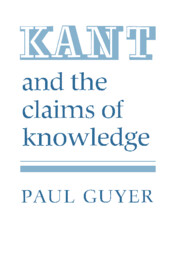Book contents
- Frontmatter
- Contents
- Acknowledgments
- Note on sources
- Introduction
- Part I Kant's early view
- Part II The transcendental deduction from 1781 to 1787
- Part III The principles of empirical knowledge
- 6 The schematism and system of principles
- 7 Axioms and anticipations
- 8 The general principle of the analogies
- 9 The first analogy: substance
- 10 The second analogy: causation
- 11 The third analogy: interaction
- Part IV The refutation of idealism
- Part V Transcendental idealism
- Afterword
- Notes
- Index of passages cited
- General index
7 - Axioms and anticipations
Published online by Cambridge University Press: 09 March 2010
- Frontmatter
- Contents
- Acknowledgments
- Note on sources
- Introduction
- Part I Kant's early view
- Part II The transcendental deduction from 1781 to 1787
- Part III The principles of empirical knowledge
- 6 The schematism and system of principles
- 7 Axioms and anticipations
- 8 The general principle of the analogies
- 9 The first analogy: substance
- 10 The second analogy: causation
- 11 The third analogy: interaction
- Part IV The refutation of idealism
- Part V Transcendental idealism
- Afterword
- Notes
- Index of passages cited
- General index
Summary
Mathematical and dynamical principles
Beyond the principles of logic and the synthetic a priori propositions of pure mathematics, Kant's original transcendental theory of experience assumed that the forms of intuition sufficed to entail that external objects would have a determinate magnitude, and appealed to the * ‘titles of the understanding” only to establish the a priori application of the concepts of substance, causation, and interaction to such independently existent external objects. In other words, the theory anticipated only Kant's mature analogies of experience and refutation of idealism, even if it did not yet include any detailed anticipation of the arguments which Kant eventually produced. At this early stage of his thought, as we saw in Part I, Kant did not yet separate the transcendental deduction of these principles from the demonstration of their role in time-determination or the “exposition” of appearances. When Kant did introduce the conception of a separate transcendental deduction, as we saw in Part II, he created a gap between the categories, which are most closely connected with the logical functions of judgment, and the principles of time-determination – although, as we also saw, his attempts to derive the categories from the logical functions of judgment while also showing them to have extralogical content were of dubious success. In the last chapter, we saw that Kant attempted to use the theory of the schematism to close the gap between categories and timedetermination that had been opened by his insertion of a separate transcendental deduction.
- Type
- Chapter
- Information
- Kant and the Claims of Knowledge , pp. 183 - 206Publisher: Cambridge University PressPrint publication year: 1987



